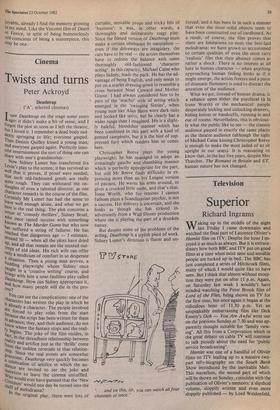Cinema
Twists and turns
Peter Ackroyd
Deathtrap ('A', selected cinemas)
Isaw Deathtrap on the stage some years ago: it didn't make a bit of sense, and I forgot the plot as soon as I left the theatre, but I loved it I remember a dead body sud- denly springing to life; everyone gasped. Then Dennis Quilley kissed a young man, and everyone gasped again. Perfectly inno- cent entertainment the sort of thing one can share with one's grandmother. Now Sidney Lumet has transferred Ira Levin's play to the screen; it has survived so well that it proves, if proof were needed, that such old-fashioned goods are really quite tough. They can withstand the on- slaughts of even a talented director, as .one Character remarks in the course of the film. Certainly Mr Lumet has had the sense to leave well enough alone, and what we get here is the real thing. The plot concerns a writer of 'comedy thrillers', Sidney Bruel, who once tasted success with something Known as The Murder Game but who now has suffered a string of failures. He has reached that dangerous age — I estimate, around 50 — when all the plots have dried 1113, and all that remain are the stunted out- crops of old ideas. His rich wife can offer °nly a modicum of comfort in so desperate a situation. Then a young man arrives, a budding playwright whom Sidney once taught . in a 'creative writing' course, and brings with him a near-faultless play called _eathtrap. How can Sidney appropriate it, and how many people will die in the pro- cess?
You can see the complications: one of the characters has written the play in which he Is already a character. The people involved !re forced to play roles from the start ,uecause the script has been written for them inadvance; they, and their audience, do not t know where the fantasy stops and the reali- Y begins. The joke of the film resides, in fact, in the threadbare relationship between reality and artifice just as the 'thrills' come 1°. m the sudden reversals in that relation- 'inn. Since the real events are somewhat gamesome, Deathtrap very quickly becomes celebration of artifice in which the au- tkience are invited to see the joke and \'‘'ierefore to leave the cinema unruffled.
h, would ever have guessed that the 'New would one day be turned into the stuff of melodrama? In the original play, there were lots of
curtains, movable props and tricky bits of 'business': it was, in other words, a thoroughly and deliberately stagy play. Since the filmed version of Deathtrap must make a certain obeisance to naturalism even if the driveways are imaginary, the cars have to be real — the actors themselves have to redress the balance with some thoroughly old-fashioned 'character acting'. In this capacity, Michael Caine who plays Sidney, leads the pack. He has the ad- vantage of being English, and only needs to put on a scarlet dressing-gown to resemble a cross between Noel Coward and Mother Goose, I had always considered him to be part of the 'macho' style of acting which emerged in the 'swinging Sixties', when young men like Alan Bates wore dark suits and looked like spivs, but he clearly has a wider range than I imagined. His is a slight- ly baleful, bloodshot manner which has been combined in this part with a kind of genteel campiness, but it is the hint of sup- pressed fury which renders him so comic here.
Christopher Reeve plays the young playwright; he has managed to adopt an irritatingly gauche and shambling manner which is perfectly appropriate for the part, but still Mr Reeve finds difficulty in ex- pressing more than an Ivy League version of passion. He waves his arms around, or gives a crooked little smile, and that's that. Irene Worth, who for reasons I cannot fathom plays a Scandinavian psychic, is not a success. Her delivery is uncertain, and she looks as though she has strayed in- advertently from a Walt Disney production where she is playing the part of a drunken nanny.
But despite some of the problems of the acting, Deathtrap is a stylish piece of work. Sidney Lumet's direction is fluent and un- . . and on this, sir, you can watch all four channels at once.' forced, and it has been lit in such a manner that even the most solid objects seem to have been constructed out of cardboard. As a result, of course, the film proves that there are limitations to even the best-laid melodrama; we have grown so accustomed to certain qualities of even the most tatty 'realistic' film that their absence comes as rather a shock. There is no interest at all here in human character — when anything approaching human feeling looks as if it might emerge, the action freezes and a piece of dramatic flummery is used to distract the attention of the audience.
What we get, instead of human drama, is a reliance upon either the psychical (a la Irene Worth) or the mechanical: people desperately locking and unlocking drawers, hiding knives or handcuffs, running in and out of rooms. Nevertheless, this is obvious- ly what the public like to see — the cinema audience gasped in exactly the same places as the theatre audience (although the sight of Michael Caine kissing Christopher Reeve is enough to make the most jaded of us sit upright in our seats). It is reassuring to know that, in the last five years, despite Mrs Thatcher, The Romans in Britain and ET, human nature has not changed.










































 Previous page
Previous page